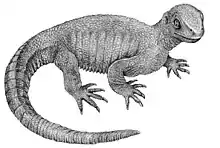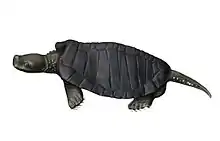Glyptops
Glyptops is an extinct genus of pleurosternid freshwater turtle known from the Late Jurassic of North America.
| Glyptops Temporal range: | |
|---|---|
 | |
| Skull and shell of Glyptops ornatus, and shell of Adocus punctatus | |
| Scientific classification | |
| Domain: | Eukaryota |
| Kingdom: | Animalia |
| Phylum: | Chordata |
| Class: | Reptilia |
| Clade: | Pantestudines |
| Clade: | Testudinata |
| Clade: | †Paracryptodira |
| Family: | †Pleurosternidae |
| Genus: | †Glyptops Marsh, 1890 |
| Species | |
| |
| Synonyms | |
| |
Taxonomy
The type species, Glyptops plicatulus, was first described as Compsemys plicatulus by Edward Drinker Cope on the basis of AMNH 6099, a partial shell from the Late Jurassic (Tithonian) aged Morrison Formation of Colorado.[1] In 1890, a partial skull, YPM 1784 (described from Como Bluff, Wyoming), was named Glyptops ornatus by Othniel Charles Marsh.[2] Later, Oliver Perry Hay recognized Compsemys plicatulus and Glyptops ornatus as being from the same species, hence the new combination G. plicatulus.[3] Another Morrison species of Glyptops, G. utahensis, was described from a complete shell (CM 3412) found at Dinosaur National Monument in Utah.[4] Glyptops later became a wastebasket taxon to refer to isolated shell fragments with a finely sculpted surface texture. The type of Glyptops plicatulus was later judged to be a nomen dubium, due to it lacking any diagnostic characters, and Glyptops ornatus was made to be the only valid species.[5]
The species Glytops caelatus Hay, 1908 was described from the middle Cretaceous (late Aptian-early Albian) Arundel Formation of Maryland. However, it was later dismissed as a nomen dubium based on non-diagnostic remains.[6]
Description
The skull of Glyptops ornatus exhibit adaptions likely for suction feeding.[5]
References
- E. D. Cope. 1877. On reptilian remains from the Dakota Beds of Colorado. Proceedings of the American Philosophical Society 17(100):193-196
- O. C. Marsh. 1890. Notice of some extinct Testudinata. The American Journal of Science and Arts, series 3 40:177-179
- O. P. Hay. 1908. The fossil turtles of North America. Carnegie Institution of Washington Publication 75:1-568.
- C. W. Gilmore. 1916. Description of a new species of tortoise from the Jurassic of Utah. Annals of Carnegie Museum 10(1-2):7-12.
- Joyce, Walter G.; Anquetin, Jérémy (October 2019). "A Review of the Fossil Record of Nonbaenid Turtles of the Clade Paracryptodira". Bulletin of the Peabody Museum of Natural History. 60 (2): 129–155. doi:10.3374/014.060.0204. ISSN 0079-032X. S2CID 203780510.
- E. S. Gaffney. 1979. The Jurassic turtles of North America. Bulletin of the American Museum of Natural History 162(3):95-135
- Glyptops at The Paleobiology Database

